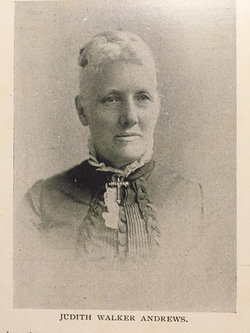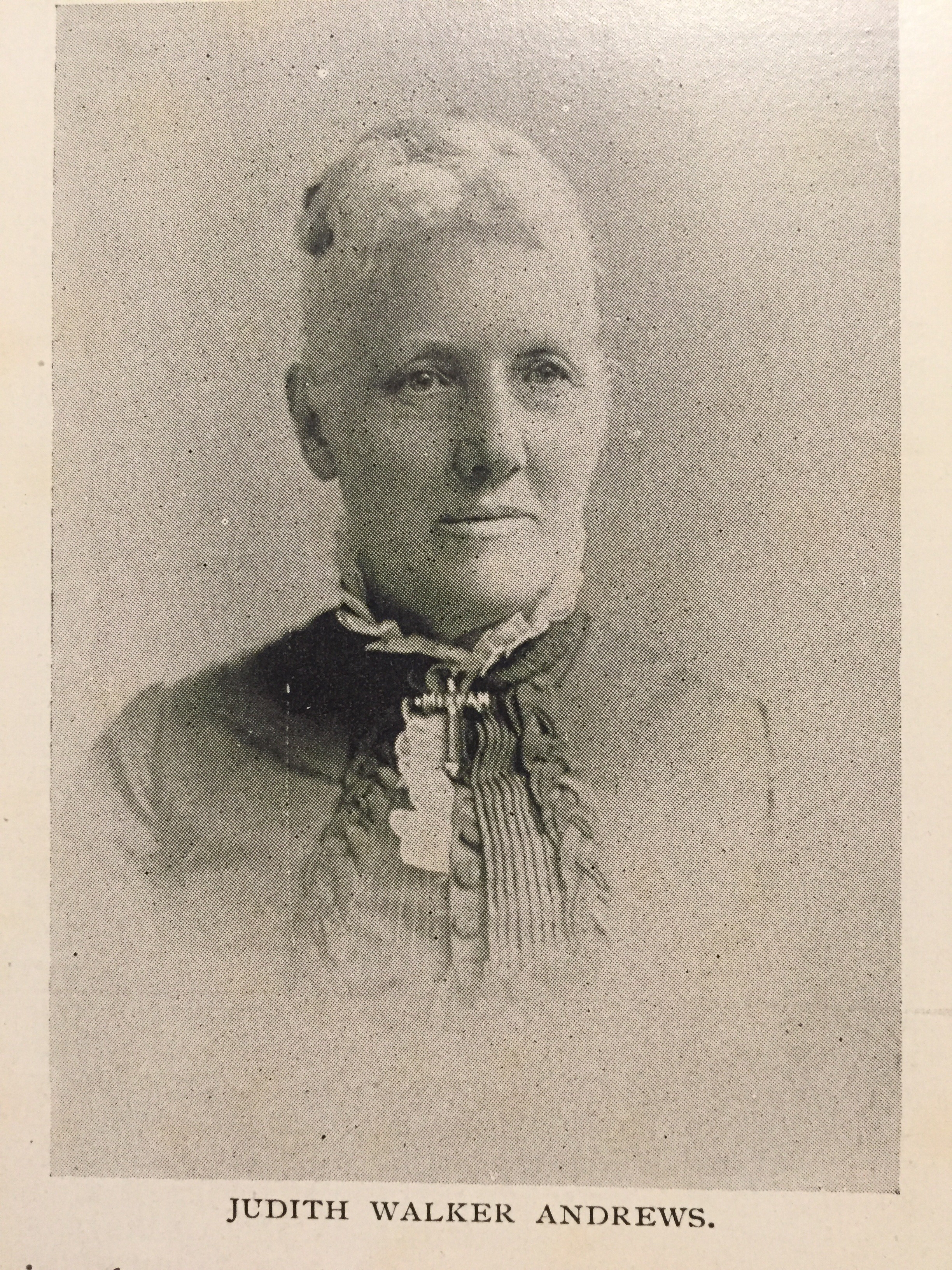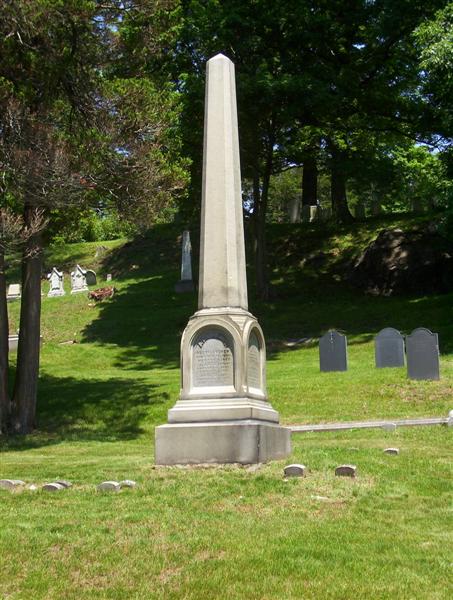From Woman of the Century/Judith Walker Andrews: ANDREWS, Mrs. Judith Walker, philanthropist, born in Fryeburgh, Maine, 26th April. 1826. She was educated in Fryeburgh Academy with the intention, so common with New England girls, of becoming a teacher. Her brother. Dr. Clement A. Walker, one of the first of the new school of physicians for the insane, having been appointed to the charge of the newly established hospital of the city of Boston, his sister joined him there. Although never officially connected with the institution, which had already gained a reputation as a pioneer in improved administration of the work for the insane, Miss Walker interested herself in the details of that administration, and by her personal attention to the patients endeared herself to them. No better school of training could be found for the activities to which she has given her life. She was married while in the institution, on 15th January, 1857, to Joseph Andrews, of Salem, a man of generous public spirit, who gave much time and labor to the improvement of the militia system of the commonwealth, both before and during the Civil War. He died in 1869. They had three children, all boys, to whose early education Mrs. Andrews gave the years, only too few, of a happy married life. Removing to Boston in 1863, she became a member of the South Congregational Church (Unitarian), and in 1876 was elected president of its ladies' organization, the South Friendly Society. Her service of sixteen years in that office is only one of five such terms in the history of the society. Under the influence of its pastor, Dr Edward Everett Hale, the South Congregational Church has had wide relations both inside and outside denominational lines, and these relations have brought to Mrs. Andrews opportunities for religious and philanthropic work to which she always has been ready to respond. While most of these, though requiring much work and thought, are of a local character, two lines of her work have made her name familiar to a large circle. Elected, in 1886, president of the Women's Auxiliary Conference, she was active in the movement to enlarge its scope and usefulness, and in 1889, when the National Alliance of Unitarian and Other Liberal Christian Women was organized, she became its first president, declining re-election in 1891. Since 1889 she has been a member of the Council of the National Unitarian Conference. Having become interested in the child-widows of India, through the eloquence, and later the personal friendship, of Pundita Ramabai, she was largely instrumental in the formation of the Ramabai Association, to carry out the plans of Ramabai and to systematize the work of her friends throughout the country. To the executive committee of that association, of which Mrs. Andrews has been chairman from the begining, is entrusted the oversight of the management of :he school for child-widows, the Shârâda Sadana at Poona and the settlement of the many delicate questions arising from a work so opposed to the customs though fortunately not to the best traditions, of India.
Contributor: Elisa Rolle (48982101)
From Woman of the Century/Judith Walker Andrews: ANDREWS, Mrs. Judith Walker, philanthropist, born in Fryeburgh, Maine, 26th April. 1826. She was educated in Fryeburgh Academy with the intention, so common with New England girls, of becoming a teacher. Her brother. Dr. Clement A. Walker, one of the first of the new school of physicians for the insane, having been appointed to the charge of the newly established hospital of the city of Boston, his sister joined him there. Although never officially connected with the institution, which had already gained a reputation as a pioneer in improved administration of the work for the insane, Miss Walker interested herself in the details of that administration, and by her personal attention to the patients endeared herself to them. No better school of training could be found for the activities to which she has given her life. She was married while in the institution, on 15th January, 1857, to Joseph Andrews, of Salem, a man of generous public spirit, who gave much time and labor to the improvement of the militia system of the commonwealth, both before and during the Civil War. He died in 1869. They had three children, all boys, to whose early education Mrs. Andrews gave the years, only too few, of a happy married life. Removing to Boston in 1863, she became a member of the South Congregational Church (Unitarian), and in 1876 was elected president of its ladies' organization, the South Friendly Society. Her service of sixteen years in that office is only one of five such terms in the history of the society. Under the influence of its pastor, Dr Edward Everett Hale, the South Congregational Church has had wide relations both inside and outside denominational lines, and these relations have brought to Mrs. Andrews opportunities for religious and philanthropic work to which she always has been ready to respond. While most of these, though requiring much work and thought, are of a local character, two lines of her work have made her name familiar to a large circle. Elected, in 1886, president of the Women's Auxiliary Conference, she was active in the movement to enlarge its scope and usefulness, and in 1889, when the National Alliance of Unitarian and Other Liberal Christian Women was organized, she became its first president, declining re-election in 1891. Since 1889 she has been a member of the Council of the National Unitarian Conference. Having become interested in the child-widows of India, through the eloquence, and later the personal friendship, of Pundita Ramabai, she was largely instrumental in the formation of the Ramabai Association, to carry out the plans of Ramabai and to systematize the work of her friends throughout the country. To the executive committee of that association, of which Mrs. Andrews has been chairman from the begining, is entrusted the oversight of the management of :he school for child-widows, the Shârâda Sadana at Poona and the settlement of the many delicate questions arising from a work so opposed to the customs though fortunately not to the best traditions, of India.
Contributor: Elisa Rolle (48982101)
Family Members
Sponsored by Ancestry
Advertisement
Records on Ancestry
Advertisement












